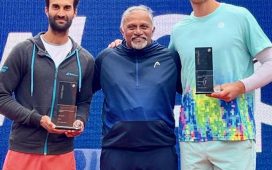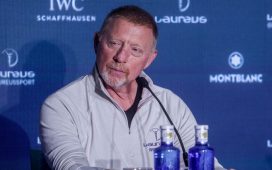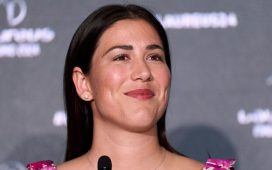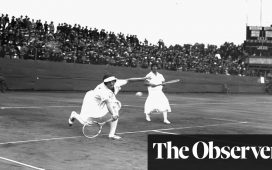For someone who is so loved, Ashleigh Barty knows a lot about loneliness. “I would love to be home every single minute of every single day,” says the world No 1 and French Open champion, whose home is 12,000 miles away in Queensland, but whose heart and soul for the next fortnight will be at Wimbledon.
She knows, too, about the deadening weight of expectation, the spirit-crushing hopes of others that nearly finished her career before it had properly started, and she is forever grateful that she survived with the help of friends and family.
“The most important thing is all the people around me I trust,” she says. “They are genuine, real human beings. So, besides the tennis, we have relationships off the court first and foremost – and then the tennis comes second. Every single member of my team is like family to me.”
It is an odd view for a young, driven athlete to take: that her sport comes second – although Andy Murray has been making similar noises about the autumn of his career. They have much in common. It is hard, also, to picture her in any way disconsolate, so upbeat is the 23-year-old’s demeanour.
However, 10 years ago, when she was a sparkling teenage presence around Ipswich, about 25 miles south-west of Brisbane, all smiling exuberance and clever ground strokes, a sponsor sent her to Las Vegas to spend a week with the royal couple of tennis, Andre Agassi and Steffi Graf. Soon afterwards, the hype was ramped up to a level she was not expecting.
As she recalls: “I was 13, 14, playing against other WTA players. It was an eye-opening experience. Any time you get to rub shoulders with legends, it’s incredible. To be able to speak with them – albeit very briefly – made memories that I will never forget.”
Barty returned home and started winning trophies, often beating players older and more experienced than herself. Australians, who value sport on a par with religion and way above politics, had found their Joan of Arc. Then Barty hit a wall. One year on Tour, she was out of the country for all but 73 days.
“There are different pressures [growing up as a prodigy], but it’s how you deal with them. And I didn’t deal them with them well. I didn’t deal with all the noise that was going on around me while I was younger.”
As she prepares for the tournament that suits her game perhaps best of all, expectations mount again after her maiden grand slam victory in Paris this month. Adored by old friends as well as a new audience enchanted by her quiet self-confidence, rapid-fire straight talking and good humour, she is, as she says “living the dream”. But Barty can see past the well-meaning words and the smiles of others.

When the 20-year-old British player Katie Swan failed to make the main draw at Roland Garros, she revealed she had considered pulling out of the qualifying tournament. Swan, whose sunny disposition has hidden her anxieties from even close friends, said she feared “disappointing my family, team and all the people around supporting me”.
It had a scarily familiar ring for Barty. “It’s not just people in sport. Mental health is something that concerns everyone. It’s spoken about more often now, though, a sort of open topic. That’s positive. Everyone has different kinds of struggles. I read a little bit about Katie and I thought she was incredibly strong and courageous to be able to talk about that. That was my hardest step, as well – coming out and actually talking about it.
“But I’ve learned to embrace [fame], to accept it and just to move on. I’m still trying to go about my work in a correct manner, doing all the right things. It’s impossible to please everyone. You have to trust in what you believe. I trust in my team, the people I have around me, and understand that there are going to be some amazing times and some tough times. But we’ll go through it together, and that’s the best way.”
Craig Tyzzer is her coach, and she consults the former Tour player Jason Stoltenberg, as well as relying heavily on her strength and conditioning advisor, Mark “Tubby” Taylor, and Ben Crowe, who might be described as a mind coach. And the mentor who developed her nascent talent when she was little higher than a racket, Jim Joyce, is always nearby.

A Barty (Aus, 1) v Zheng S (Chn)
S Kuznetsova (Rus) v A Van Uytvanck (Bel)
H Dart (GB) v C McHale (US)
B Haddad Maia (Bra) v G Muguruza (Sp, 26)
D Vekic (Cro, 22) v A Riske (US)
L Kerkhove (Neth) v I Jorovic (Srb)
S Voegele (Sui) v K Kanepi (Est)
A Pavlyuchenkova (Rus) v B Bencic (Sui, 13)
Serena Williams (US, 11) v G Gatto-Monticone (It)
K Juvan (Slo) v Kr Pliskova (Cz)
P Badosa Gibert (Sp) v V Flink (Rus)
E-G Ruse (Rom) v J Görges (Ger, 18)
C-S Navarro (Spa, 30) v S Stosur (Aus)
M Sharapova (Rus) v P Parmentier (Fr)
K Kozlova (Ukr) v L Davis (US)
T Maria (Ger) v A Kerber (Ger, 5)
K Bertens (Neth, 4) v M Minella (Lux)
A Rodionova (Aus) v T Townsend (US)
L Siegemund (Ger) v K Swan (GB)
B Strycova (Cz) v L Tsurenko (Ukr, 32)
E Mertens (Bel, 21) v F Ferro (Fr)
A Petkovic (Ger) v M Niculescu (Rom)
T Zidansek (Slo) v E Bouchard (Can)
V Lapko (Blr) v Wang Q (Chn, 15)
S Stephens (US, 9) v T Bacsinszky (Sui)
Wang Y (Chn) v T Martincova (Cz)
E Alexandrova (Rus) v K Siniakova (Cz)
A Bogdan (Rom) v J Konta (GB, 19)
A Anisimova (US, 25) v S Cirstea (Rom)
M Linette (Pol) v A Kalinskaya (Rus)
V Diatchenko (Rus) v K Mladenovic (Fr)
O Jabeur (Tun) v P Kvitova (Cz, 6)
E Svitolina (Ukr, 8) v D Gavrilova (Aus)
M Gasparyan (Rus) v A-L Friedsam (Ger)
M Bouzkova (Cze) v M Barthel (Ger)
B Pera (US) v M Sakkari (Gre, 31)
P Martic (Cro, 24) v J Brady (US)
A Potapova (Rus) v J Teichmann (Sui)
D Collins (US) v Z Diyas (Kaz)
K Ahn (US) v A Sevastova (Lat, 12)
M Vondrousova (Cze, 16) v M Brengle (US)
K Muchova (Cz) v A Krunic (Srb)
C McNally (US) v H Watson (GB)
S Rogers (USA) v A Kontaveit (Est, 20)
S-w Hsieh (Tpe, 28) v J Ostapenko (Lat)
D Jakupovic (Slo) v K Flipkens (Bel)
A-K Schmiedlova (Svk) v M Puig (Pue)
Zhu L (Chn) v Ka Pliskova (Cze, 3)
S Halep (Rom, 7) v A Sasnovich (Blr)
M Buzarnescu (Rom) v J Pegula (US)
A Cornet (Fr) v V Azarenka (Blr)
A Tomljanovic (Aus) v D Kasatkina (Rus, 29)
M Keys (US, 17) v L Kumkhum (Thai)
P Hercog (Slo) v V Kuzmova (Svk)
V Williams (US) v C Gauff (US)
M Rybarikova (Svk) v A Sabalenka (Blr, 10)
C Wozniacki (Den, 14) v S Sorribes Tormo (Sp)
V Kudermetova (Rus) v Y Bonaventure (Bel)
R Peterson (Swe) v Y Wickmayer (Bel)
Zhang S (Chn) v C Garcia (Fr, 23)
S Kenin (US, 27) v A Sharma (Aus)
D Yastremska (Ukr) v C Giorgi (Ita)
I Swiatek (Pol) v V Golubic (Sui)
Y Putintseva (Kaz) v N Osaka (Jpn, 2)
Barty often talks about herself in the plural, which has been misconstrued as self-importance. It is exactly the opposite. She shares the sunshine and the clouds with her small and loyal group – unlike Nick Kyrgios, an Australian of a different mindset: stubborn, set apart from the pack and determined to find his own path, without a coach, as well as no censure.
“I’ve known Nick since we were 13 years old, travelled with him when he was younger. I can’t really comment [about his recent behaviour]. I don’t spend enough time with him now. We’re on different tours and we don’t cross paths too often. It’s hard to put words into his mouth but he just needs to figure out what he wants to do and how he wants to go about it. The most important thing is it’s his decision, his career. It’s up to him if he can make those decisions.”
What saved Barty was cricket. She famously walked from tennis at just the point when she was expected to be on the rise as a professional. For six months she played with the Brisbane Heat in the women’s Big Bash – having never taken part in a serious game of cricket in her young life – and was an instant success. Again. It seemed she was blessed – or cursed – with sporting genes that drove her to the top.
Could she have been an international? Others thought so. Not Barty. “I didn’t think I was good enough, if I’m being honest. I mean, I only played for six months. The standard of women’s cricket in Australia is so high, there are a lot of girls a lot better than me. I was really enjoying my time, but deep down I knew that tennis was my sport. It’s a sport that I’ve loved since I was five years old. I just needed to get that passion and that drive back.”
A key part of Barty’s development has been aided by her association with the Rado YoungStar programme over the past three years, in which her ranking has gone from zero, after her comeback, to the top of the pile.

As we chatted in Eastbourne this week – not long after an old shoulder injury flared to put her out of the tournament (without threatening to hinder her charge at Wimbledon, she insists) – she seems irresistibly happy. Her boyfriend, 28-year-old Australian golfer Garry Kissick, calls her “the best person I’ve ever met”. When she won the French Open, her phone nearly melted with good wishes, and the calls kept coming this week when she was elevated to No 1 in the world, only the second Australian woman to reach the summit of her sport since Evonne Goolagong Cawley 43 years ago.
Barty sets a lot of store in loyalty and friends, of whom she seems to have plenty. None stands taller than Goolagong Cawley, who won Wimbledon in 1971 and 1980 and was the most cherished Australian sporting champion of her era.
This month Barty received a text from her after sweeping aside the outstanding Czech teenager Marteka Vondrousova in 70 minutes in the anti-climactic French Open final. It said simply: “Well done, mate.”
Australians call everyone mate, but this is a real friendship, rooted in tennis and held together by a stronger bond than that. “It was probably in my early teens when I began to understand just the impact that she did have,” Barty says, “the impact that she created, paving the way for Indigenous Australians – and athletes all over the world, really. She’s an incredible story, an incredible human being. I’m very, very lucky to be able to call a legend like her my friend. The goal for us is to create more pathways and more opportunities for Indigenous youth to pick up a racket and start playing tennis – but not just tennis; to play every sport, to get involved – and not just in certain areas but nationwide.”

Barty would love to emulate Goolagong Cawley at Wimbledon, although she is no longer obsessed. She is disciplined and hard-working, knows her own game and that of her rivals. More importantly, she has found peace and perspective. Her parents remain her closest allies, comfortable enough about their famous daughter to miss her final in Paris – because they had just landed at Heathrow and did not want to make a fuss.
Her Indigenous father, Robert, a Ngarigo man, was proud to say that he and her mother, Josie, were not typical tennis parents, and “Ash certainly wouldn’t want that”.
Barty says: “My mum’s parents are English, so I have some great uncles and great aunts based around the UK, not far from Nottingham. I see them every year, and they always pop their head in and come and watch me play. It’s nice see those familiar faces every year, and nice to see the other side of my family.”
As for the day job, she says: “I’m still hungry to be better, to achieve as much as I can. The talk of pressure and expectation to me is all white noise. I try to prepare the exact same way every single match, and embrace it, enjoy it. Ultimately I know I’m not going to win every single tennis match. But I can prepare to give myself the best chance to play well in every match. And that’s what we’ll try to do.”








